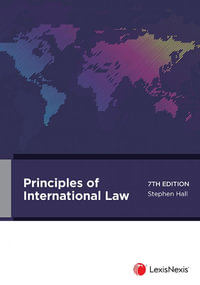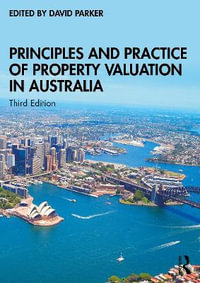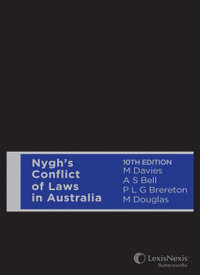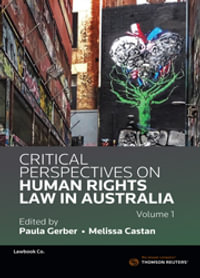
A History of the Laws of War
Volume 3: The Customs and Laws of War with Regards to Arms Control
Hardcover | 7 October 2011 | Edition Number 1
At a Glance
180 Pages
24.38 x 17.27 x 1.78
Hardcover
RRP $180.00
$132.25
27%OFF
or 4 interest-free payments of $33.06 with
orAims to ship in 5 to 10 business days
This third volume deals with the question of the control of weaponry, from the Bronze Age to the Nuclear Age. In doing so, it divides into two parts- namely, conventional weapons and Weapons of Mass Destruction. The examination of the history of arms control of conventional weapons begins with the control of weaponry so that one side could achieve a military advantage over another. This pattern, which only began to change centuries after the advent of gunpowder, was later supplemented by ideals to control types of conventional weapons because their impacts upon opposing combatants were inhumane. By the late twentieth century, the concerns over inhumane conventional weapons were being supplemented by concerns over indiscriminate conventional weapons.
The focus on indiscriminate weapons, when applied on a mass scale, is the core of the second part of the volume. Weapons of Mass Destruction are primarily weapons of the latter half of the twentieth century. Although both chemical and biological warfare have long historical lineages, it was only after the Second World War that technological developments meant that these weapons could be applied to cause large-scale damage to non-combatants. thi is unlike uclear weapons, which are a truly modern invention. Despite being the newest Weapon of Mass Destruction, they are also the weapon of which most international attention has been applied, although the frameworks by which they were contained in the last century, appear inadequate to address the needs of current times.
As a work of reference this set of three books is unrivalled, and will be of immense benefit to scholars and practitioners researching and advising on the laws of warfare. It also tells a story which throws fascinating new light on the history of international law and on the history of warfare itself.
'The law impacts on modern military operations at all levels. The importance of understanding the influence of international law, and the constraints, which it places upon the conduct of armed conflict, is an essential area of study. Dr Alexander Gillespie's three volume work traces the development and scope of this law from the earliest times through the modern day. In doing so he identifies constant themes and common principles in the law, as well, unfortunately, as all too common breaches. Commanders and historians, as well as lawyers, will find this book of great value. It is written in a practical and useful style and brings to light many fascinating examples of the law at work in times of war from which contemporary lessons can be learned'.
Brigadier Kevin Riordan, Director General of Defence Legal Services for the New Zealand Defence Forces.
'The span of scholarship on offer in these volumes is astonishing.an extraordinary gathering of historical and legal materials many of which record the most sombre and tragic events of human history - war in all its terrible forms.'
Rt Hon Sir Geoffrey Palmer, Former Prime Minister of New Zealand
'At a time of real challenge, Alexander Gillespie is to be commended for his monumental and significant contribution to our understanding of the context, practice and principles that govern war and armed conflict. This vital book is an indispensable part of any library, and will be a necessary resource for governments, NGOs, international organisers, academics and lawyers involved in the issues.'
Professor Philippe Sands QC, University College London
'This is a comprehensive and comprehensible account of the laws of, against and about war. It is both authoritative and accessible - Alexander Gillespie's great achievement is to provide a map for a better future, in which the inevitable horrors of armed conflict are recognised and minimised, and those who instigate them unlawfully are punished by international courts. This is a must-read for all concerned to ensure that war laws do not end up in the graveyard of good words.'
Geoffrey Robertson QC, founder and head of Doughty Street Chambers, author of Crimes Against Humanity (Penguin and The New Pr
Industry Reviews
The wealth of materials compiled and reviewed by Alexander Gillespie for the purpose of this book is breath-taking and one can suspect that Alexander Gillespie's books will become the mandatory starting point for anyone wishing to study the history of the laws of war in the future. -- Vincent Roobaert * NATO Legal Gazette, Issue 27 *
...libraries and professors who focus on the many elements of the [law of war] would be wise to have all three volumes at hand. Together, they provide a vivid, detailed, and especially readable account of the [law of war]. This set is destined to be described by all holders as a richly adorned, and affordable, research treasure trove. * American Society of International Law Newsletter, Issue #43 *
Review of A History of the Laws of War and The Causes of War, Volume 1 ...unique and of unquestionable relevance... both works are appreciable for the impressive quantity of the historical and legally pertinent materials gathered by the author. This is useful from the perspective of understanding the background of today's rules on the recourse to armed force and international humanitarian law. -- Carlo Focarelli * Italian Yearbook of International Law, Volume 23, 2013 *
The scourge of war never ends. If we are ever to be rid of it we need to understand the warlike history of homo sapiens. Professor Gillespie in his unique work tells us what we need to know. Will we heed it? -- Sir Geoffrey Palmer, former, Prime Minister of New Zealand, President of the New Zealand Law Commission, and chair of the UN Inquiry Panel into the Gaza Bound Flotilla of 2010
The law impacts on modern military operations at all levels. The importance of understanding the influence of international law, and the constraints, which it places upon the conduct of armed conflict, is an essential area of study. Dr Alexander Gillespie's three volume work traces the development and scope of this law from the earliest times through the modern day. In doing so he identifies constant themes and common principles in the law, as well, unfortunately, as all too common breaches. Commanders and historians, as well as lawyers, will find this book of great value. It is written in a practical and useful style and brings to light many fascinating examples of the law at work in times of war from which contemporary lessons can be learned. -- Brigadier Kevin Riordan, Director General of Defence Legal Services for the New Zealand Defence Forces
The span of scholarship on offer in these volumes is astonishing...an extraordinary gathering of historical and legal materials many of which record the most sombre and tragic events of human history - war in all its terrible forms. -- Rt Hon Sir Geoffrey Palmer, Former Prime Minister of New Zealand
At a time of real challenge, Alexander Gillespie is to be commended for his monumental and significant contribution to our understanding of the context, practice and principles that govern war and armed conflict. This vital book is an indispensable part of any library, and will be a necessary resource for governments, NGOs, international organisers, academics and lawyers involved in the issues. -- Professor Philippe Sands QC, University College London
This is a comprehensive and comprehensible account of the laws of, against and about war. It is both authoritative and accessible - Alexander Gillespie's great achievement is to provide a map for a better future, in which the inevitable horrors of armed conflict are recognised and minimised, and those who instigate them unlawfully are punished by international courts. This is a must-read for all concerned to ensure that war laws do not end up in the graveyard of good words. -- Geoffrey Robertson QC, founder and head of Doughty Street Chambers, author of Crimes Against Humanity (Penguin and The New Press)
1. The Conversation on Sunday Afternoon
2. Progress, Utopia and Warfare
3. Facts
4. Progress in the Area of Arms Control
I. Conventional Weapons
1. T he Beginnings of Arms Control
2. Gunpowder
3. Trade and Control
4. Superfluous Injury
5. Indiscriminate Injury
6. After the First World War
7. After the Second World War
8. After the Cold War
II. Weapons of Mass Destruction
1. Chemical Weapons
2. Biological Weapons
3. Nuclear Weapons
Conclusion
1. Has the Stockpiling and Flow of Weaponry to Places Where it Inflames Conflict Improved?
2. Are Weapons which Cause Unnecessary Pain Restricted?
3. What are the Customs and Practices with Indiscriminate Weapons?
ISBN: 9781849462068
ISBN-10: 1849462062
Published: 7th October 2011
Format: Hardcover
Language: English
Number of Pages: 180
Audience: Professional and Scholarly
Publisher: BLOOMSBURY 3PL
Country of Publication: GB
Edition Number: 1
Dimensions (cm): 24.38 x 17.27 x 1.78
Weight (kg): 0.48
Shipping
| Standard Shipping | Express Shipping | |
|---|---|---|
| Metro postcodes: | $9.99 | $14.95 |
| Regional postcodes: | $9.99 | $14.95 |
| Rural postcodes: | $9.99 | $14.95 |
How to return your order
At Booktopia, we offer hassle-free returns in accordance with our returns policy. If you wish to return an item, please get in touch with Booktopia Customer Care.
Additional postage charges may be applicable.
Defective items
If there is a problem with any of the items received for your order then the Booktopia Customer Care team is ready to assist you.
For more info please visit our Help Centre.
You Can Find This Book In
This product is categorised by
- Non-FictionPolitics & GovernmentInternational RelationsArms Negotiation & Control
- Non-FictionLawLaws of Specific JurisdictionsConstitutional & Administrative LawMilitary & Defence Law
- Non-FictionLawInternational LawPublic International LawInternational Humanitarian Law
- Non-FictionWarfare & Defence
- Non-FictionLawJurisprudence & General IssuesLegal Skills & Practice























